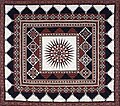History and format
The Quilt National was first held in 1979, and was the first major exhibition of quilt art in the United States, and has been held biennially ever since. [2] [5] It was also the first major event held in the Dairy Barn Arts Center space, which at the time, was still largely an unaltered dairy barn. [6] Founder Nancy Crow, along with Françoise Barnes and Virginia Randles organized the event, accepting applications from 96 artists, totaling 360 pieces. A final exhibition of 56 quilts, by 43 artists was selected for the exhibition. [6]
Since its inaugural event, the Quilt National has been held every other year at the Dairy Barn, attracting quilt artists from around the world. Beginning in 1983, a selection of the quilts displayed at the Quilt National has gone on tour around the United States. [7] Approximately 75 of the around 90 quilts on display at the Quilt National are chosen for the tour, and are divided into three tour groups, each of which travels to different venues over the course of the two-year gap between Quilt National Exhibitions. [1] [7]
Quilt National Program Directors: Hillary M. Fletcher, 1982 - 2006 Kathleen Dawson, 2006 - 2015 Holly Ittel, 2018 - current
Purpose
The Quilt National was founded with the purpose of displaying quilts as pieces of contemporary art, which differs significantly in the aesthetic and function of traditional quilts. Traditional quilts are meant to be bed coverings, whereas Art Quilters consider their work pieces of fine art, meant for display, rather than use. The Quilt National website explains, "Quilt National was intended to demonstrate the transformations taking place in the world of quilting. Its purpose was then, and still is, to carry the definition of quilting far beyond its traditional parameters and to promote quiltmaking as what it always has been — an art form." [8]
At the time of the first Quilt National, there was no organized body for the collection and display of art quilts, and many traditional quilting venues refused to display them. [1] [6] The 1979 Quilt National, and its accompanying catalog, are often credited with helping to establish quilting as a legitimate art form. [3]
Notable quilts and quilters
More than 700 quilt artists have displayed quilts at the Quilt National. [9] Notable pieces from the 1979 exhibition include Equis Robis I and Equis Robis II by Sharon Robinson, which are custom-shaped coverings for a horse, Earth, water, air and fire by Radka Donnell and Dawn Nebula by Michael James. [10]
Jan Myers-Newbury has displayed 17 quilts in 15 different Quilt National Exhibitions, and Linda Levin has had 15 quilts in 15 different years. [11]
Miriam Nathan-Roberts won best in show twice at Quilt National in 1982 and 1989. Her work Lattice Interweave (1983) won Viewer’s Choice Award in 1985 and her piece Spin Cycle was selected Best of Show in 1999. Her work Changing Planes was chosen as one of The Twentieth Century’s 100 Best American Quilts.
This page is based on this
Wikipedia article Text is available under the
CC BY-SA 4.0 license; additional terms may apply.
Images, videos and audio are available under their respective licenses.

